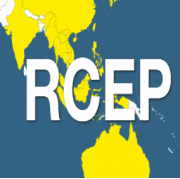Indonesia’s stance on RCEP
On August 25, 2021, Trade Minister of India, Muhammad Lutfi, presented his case for lower house of Indonesia’s legislature, for ratifying the Regional Comprehensive Economic Partnership (RCEP) trade pact.
Highlights
In his statement to DPR Commission VI, Minister had argued that RCEP will be beneficial to Indonesia. It also promises to strengthen its role in regional supply chains and improve the economic performance of the country, amid covid-19 pandemic.
Regional Comprehensive Economic Partnership (RCEP)
RCEP is a free trade agreement between Asia-Pacific nations of Australia, Brunei, China, Cambodia, Japan, Indonesia, Laos, South Korea, Malaysia, New Zealand, Myanmar, Singapore, Thailand, the Philippines, and Vietnam. India and the United States are not the member of RCEP. The 15-member grouping accounts for 30% of the world’s population and 30% of global GDP. Thus, it is the largest trade bloc in history.
Aims of RCEP
RCEP aims to:
- Lower tariffs, open up trade in services as well as promote investment in order to help emerging economies to catch up with developed economies.
- Help in reducing costs and time for companies, as the deal allows them to export products anywhere within the bloc without the need of complying with separate norms for each country.
Why India is not a part of RCEP?
India did not join RCEP raising a concern that, this deal would open it up to Chinese goods, and thus increase its trade balance with China.
History of RCEP
Negotiations on the RCEP deal started in 2012. India was also part of the negotiations. However, India pulled out in 2019 because of concerns over lower tariffs. Before India, RCEP excluded the USA, which had withdrawn from the Trans-Pacific Partnership (TPP) in 2017.
Month: Current Affairs - December, 2021


